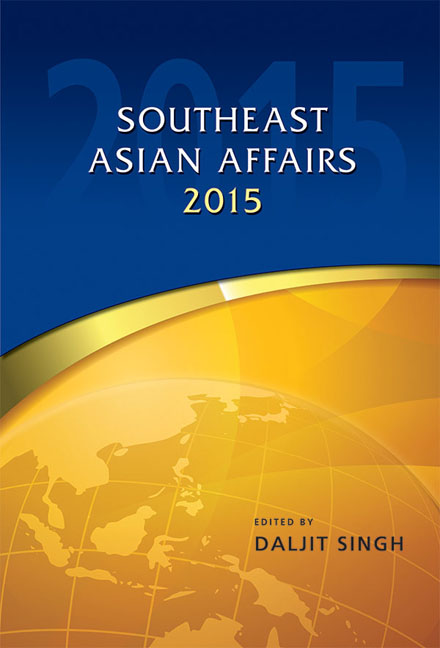Book contents
- Frontmatter
- Contents
- Foreword
- Introduction
- Acknowledgements
- THE REGION
- BRUNEI DARUSSALAM
- CAMBODIA
- INDONESIA
- LAOS
- MALAYSIA
- MYANMAR
- THE PHILIPPINES
- The Philippines in 2014: The More Things Stay the Same
- Typhoon Yolanda: The Politics of Disaster Response and Management
- SINGAPORE
- THAILAND
- TIMOR-LESTE
- VIETNAM
The Philippines in 2014: The More Things Stay the Same
from THE PHILIPPINES
Published online by Cambridge University Press: 19 May 2017
- Frontmatter
- Contents
- Foreword
- Introduction
- Acknowledgements
- THE REGION
- BRUNEI DARUSSALAM
- CAMBODIA
- INDONESIA
- LAOS
- MALAYSIA
- MYANMAR
- THE PHILIPPINES
- The Philippines in 2014: The More Things Stay the Same
- Typhoon Yolanda: The Politics of Disaster Response and Management
- SINGAPORE
- THAILAND
- TIMOR-LESTE
- VIETNAM
Summary
The year 2014 reaffirmed the strongest underlying assumption of resilient continuity in Philippine political studies and by all early indicators 2015 will as well. This idea of resilient continuity is at the core of most academic and journalistic analysis of the Philippines. David Timberman referred to the Philippines as “changeless land”, while the last two Southeast Asian Affairs’ Philippines chapters also were organized around this prevalent idea. Structure determines agency.
The preponderant view is that this powerful, resilient continuity is bad for Philippine society and is deeply rooted in the nature of the Philippine political system (cacique democracy), domestic economy (booty capitalism) and controversially a damaged post-colonial culture. This sobering often defeatist image of the country heavily affects many Filipinos’ own views of their state and nation. A minority of local scholars have challenged this dominant narrative on both nationalist and analytical grounds while noting that most of its seminal works are by American scholars. These repeated challenges have had little effect.
The single six-year term of Benigno Aquino III, which in 2014 moved from its mid-term to late-term phase, acts as a good test of this resilient and negative continuity assumption. President Benigno ‘PNoy’ Aquino III personally reaffirms political elite continuity being the son of the Philippines’ first post-Marcos president, Corazon Aquino, and the leading anti-Marcos politician, Benigno Aquino Jr., as well as the present scion of one of the most powerful Philippine political dynasties. His popularity in the 2010 elections, when he won the largest plurality of all post- Marcos presidential elections, was derived much more from the popular attraction of his family name and enhanced by sympathy from the death of his mother in August 2009 than by his unimpressive twelve-year record as a legislator.
Yet by 2010, the Philippine economy was already the strongest performer in maritime Southeast Asia and had sailed through the global financial crisis largely unperturbed. It belied the country's “sick man of Asia” moniker and the assumption that political continuity in the Philippines predetermines economic stasis especially in comparison to its previously higher-performing Southeast Asian neighbours.
- Type
- Chapter
- Information
- Southeast Asian Affairs 2015 , pp. 263 - 276Publisher: ISEAS–Yusof Ishak InstitutePrint publication year: 2015



